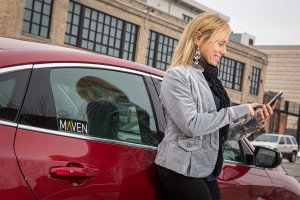General Motors apparently hopes to become an industry maven when it comes to alternative mobility programs. After investing in two ride-sharing services, Lyft and Sidecar, this month, the Detroit automaker says it will start a new car-sharing company called Maven – a Yiddish word for “expert.”
GM is just one of a growing number of automakers who are looking for alternative ways to appeal to potential customers at a time when younger consumers seem less interested in owning a vehicle. Both Daimler AG’s Mercedes-Benz brand and Ford Motor Co. are making similar forays, Ford CEO Mark Fields saying his goal is to transform the smaller Detroit maker into a “mobility” company.
“With the launch of our car-sharing service through Maven, the strategic alliance with ride-sharing company Lyft, and building on our decades of leadership in vehicle connectivity through OnStar, we are uniquely positioned to provide the personalized mobility services our customers expect today and in the future,” GM President Dan Ammann said.
GM began the month by announcing a $500 million investment in Lyft, the chief rival to ride-sharing service Uber, then followed up with a partnership with Sidecar. The company is not saying how much it will spend to get Maven going, though it did say the car-sharing firm will have a staff of 40 employees who have been hired from the connected car field, as well as from Sidecar, Google and rival car-sharing service Zipcar.
(Click Here for more on GM’s move into ride-sharing with Lyft and Sidecar.)
The new service will launch operations in three U.S. cities: New York, Chicago and the college community of Ann Arbor, Michigan. It also will operate in Frankfurt and Berlin. That mirrors what Zipcar and other competitors have been doing, focusing on big cities and college towns where consumers are less likely to own a vehicle and more likely to seek out alternative mobility services.
A new study by the University of Michigan Transportation Research Center would suggest that there are growing numbers of potential customers. Where more than 90% of Americans aged 20 to 24 held a driver’s license in 1983, that was down to around 76% in 2014. But the study found a similar decline among all age groups, including Baby Boomers.
(For more on that new study, Click Here.)
Ammann pointed out that car-sharing and ride-sharing services each target different opportunities. Companies like Lyft and Sidecar provide a high-tech alternative to traditional taxi fleets. A motorist uses a smartphone app to call for a ride and the service automatically handles cashless billing. This can provide a way for those without a license to get around.
A service like Maven – or Zipcar – offers an alternative to conventional car rental companies. Vehicles are typically taken out for short periods, with prices generally running between $6 and $12 an hour, notes Maven’s website. And rather than using a central location, vehicles may be parked at dedicated spots around a community, making it easy to pick up and return them.
Manufacturers like GM, Ford and Mercedes have several motives for getting into mobility services. For one thing, the numbers are alluring. Ford CEO Fields notes that where automakers collectively generate about $3 trillion in global sales each year, today’s mobility alternatives already are worth over $5 billion, money, he notes, that seldom falls into the hands of traditional automakers.
GM revealed another motive in announcing its Lyft investment. It plans to encourage the service’s drivers to use the new Chevrolet Bolt, a new battery-electric vehicle that will deliver a 200-mile range and target the mainstream with a price of around $30,000 after factoring in U.S. government tax incentives.
The carmaker has not said whether it will offer the Bolt through the new Maven, but other makers have also used car-sharing programs to promote greener models and those designed specifically for an urban environment. In Portland, Oregon, among a number of cities, drivers can take out the new Smart fortwo microcar at a number of locations.
GM’s Ammann said during a news conference that the company expects to expand Maven to other cities. But it will have growing competition. Along with Zipcar, a number of traditional daily rental firms have begun operating their own car-sharing services.
And ride-sharing alternatives are hoping to draw away some of those customers by making it easy and cost-effective to hail a ride from anywhere. Uber this week begins pickups directly from busy Los Angeles airport, for example.
What seems clear, analysts stress, is that mobility alternatives are going to grow rapidly in the coming years, and automakers are racing to find ways to turn them into profit centers.
(Click Here for details about a potential partnership between Ford and Google.)



